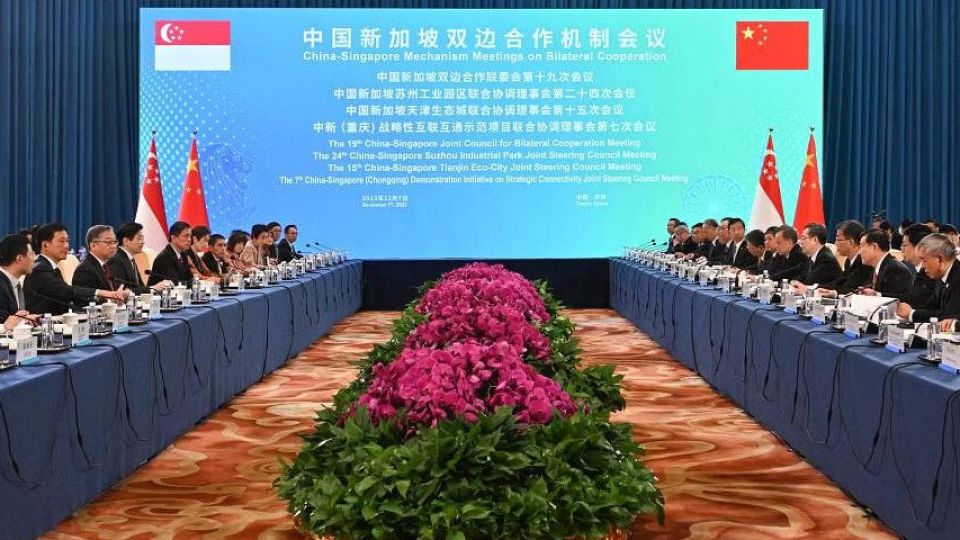December 8, 2023
TIANJIN – People and business flows between Singapore and China look set to expand, with an upgraded free trade pact that gives Singapore firms greater access to China’s services sectors.
A new visa-free arrangement is also expected to kick in from early 2024, allowing Singaporeans and Chinese nationals to visit the other country for up to 30 days with no need for a visa.
Both announcements at the 19th Joint Council for Bilateral Cooperation (JCBC), along with more than 20 memorandums of understanding (MOUs) and agreements inked, put flesh on the relationship that was upgraded in April, heralding what both sides said is a new era of cooperation.
The visa-free arrangement, for instance, will “enable more people-to-people exchanges, thereby fortifying the bedrock of our bilateral relations”, Deputy Prime Minister Lawrence Wong said on Dec 7 at the top bilateral forum which he co-chairs.
His Chinese counterpart, Vice-Premier Ding Xuexiang, said that such exchanges have become “even more active” post-pandemic. There are now over 40,000 students from China studying in Singapore, he added.
Currently, China passport holders have to apply for a visa to enter Singapore. Singaporeans can visit China for up to 15 days visa-free.
“This year has been particularly significant in the development of Sino-Singapore ties,” Mr Ding said. “I believe that through our efforts, this meeting will bear fruitful results.”
In April, Singapore and China upgraded bilateral relations to an “all-round, high-quality, future-oriented partnership”.
“This upgrade is not just a change in name. It reflects our shared aspirations to set more ambitious goals in our cooperation between our two countries,” said DPM Wong.
“And we have projects that truly reflect the key elements of our partnership, which is one that is comprehensive and of all-round, high quality, as well as future oriented.”
Noting that this is the first JCBC since the upgrade, DPM Wong said the meeting is also significant as it marks the 15th anniversary of the Tianjin Eco-City project, the two countries’ second government-to-government project after Suzhou Industrial Park.
“The Eco-City is a visionary project that seeks to develop a model of city development that is environmentally sustainable, and we set about doing this even before environmental issues like climate change became a key global agenda.”
He was personally involved in the development of the Tianjin Eco-City for a number of years when he was minister for national development. “It is very heartening to come back here and see how far the development has progressed these last 15 years,” said DPM Wong.
The China-Singapore Free Trade Agreement is China’s first comprehensive bilateral free trade agreement with an Asian country. It entered into force in 2009 and was upgraded in 2019.
Under the Further Upgrade Protocol, Singapore firms will secure greater market access to China’s services sectors. At the same time, China will lift foreign equity limits – currently set at 50 per cent – for Singapore investors in 22 sectors such as construction, as well as retail and wholesale.
Singapore investors and service suppliers will also benefit from more liberal and transparent rules, making it easier for them to invest and trade in China.
In 2021, China was Singapore’s fourth-largest trading partner in services, while Singapore was China’s third-largest.
DPM Wong and Mr Ding agreed that Singapore-China cooperation had been “comprehensive and progressive, evolving over the years”, Singapore’s Prime Minister’s Office (PMO) said. They agreed on a “forward-leaning” approach, tapping emerging areas like digital trade and artificial intelligence.
On Tianjin Eco-City, both men welcomed new efforts to reinvigorate bilateral cooperation, with a focus on fresh opportunities in the green and digital economy, said the PMO. It will also act as a guide for how other cities can adopt measures and policies that are resilient to climate change.
They noted the impact of global geopolitical tensions, climate change and the digital revolution on lives and livelihoods, and both sides will continue to collaborate on combating these challenges.
Following the JCBC meeting, DPM Wong and Mr Ding went on a guided tour of Tianjin Eco-City, where they visited the Sino-Singapore Friendship Library and the Sino-Singapore Friendship Garden.
There, they unveiled an orchid named to commemorate the Tianjin Eco-City’s 15th anniversary, and planted a spruce tree as a symbol of bilateral friendship.
Both leaders also took part in a ground-breaking ceremony for the Green Innovation Park in its city centre.
DPM Wong later met Tianjin Communist Party chief Chen Min’er, who he said was “an old friend of Singapore”.
He noted Mr Chen had helped to kick-start the third government-to-government project – the China-Singapore (Chongqing) Demonstration Initiative on Strategic Connectivity – in Chongqing when the latter was party chief of Chongqing from 2017 to 2022.
“We have made good progress on that project and now, of course, we are very happy to be able to work with you on Tianjin,” he said.
DPM Wong is on a four-day official visit to China. He arrived in Beijing on Dec 5.
He is accompanied by Minister for Trade and Industry Gan Kim Yong and some of Singapore’s fourth-generation leaders such as Minister for Education Chan Chun Sing, Minister for Health Ong Ye Kung, Minister for Communications and Information Josephine Teo, and Minister for National Development Desmond Lee.


